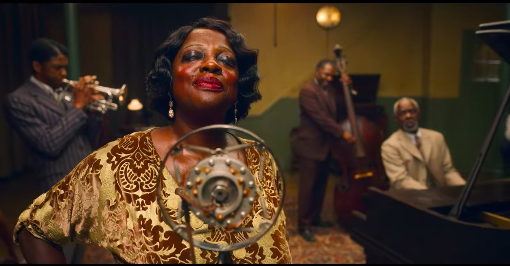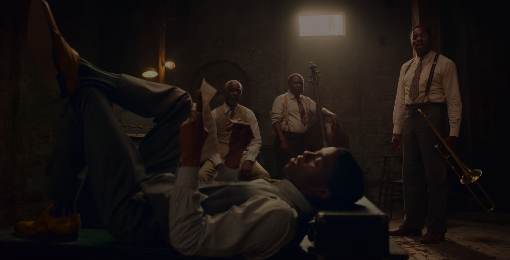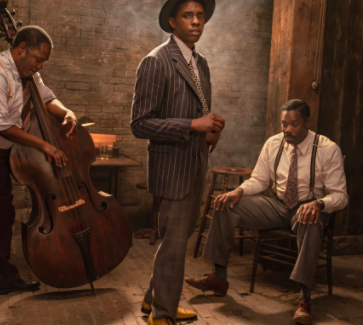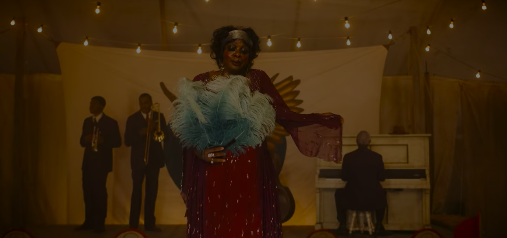by Carol Rocamora

No question about it: August Wilson’s 20th Century Cycle is one of the towering contributions to the history of the American theatre. These ten plays – one for each decade – are a lasting record of the Black experience in our country, chronicling the Great Migration north, the struggle to shed the dark legacy of slavery, and the search for a new identity of freedom, dignity, and economic independence. Born in the American regional theatres, all these plays have ended up on Broadway, providing three generations of Black actors the opportunity to play magnificently crafted characters ranging from sharecroppers to garbage truck drivers to cleaning ladies to musicians to wayfarers and mystics (e.g. Aunt Ester, a 285 year old folk figure).
So when George C. Wolfe’s film version of Ma Rainey’s Black Bottom premiered last week in all its power and glory, it unleashed a flood of commentary, singing its praises, analyzing its cinematic transformation, and reminding us of Wilson’s great legacy.


Set in 1927 and the first of the Century Cycle to make it to Broadway (the only one based on a historic character), Ma Rainey features the “Mother of the Blues” on an afternoon in a Chicago recording studio with her band, trying to record her signature song. Tensions rise to an exploding point – between the black band and the white record executives, as well as between musicians themselves – and the consequences are devastating.
Ruben Santiago-Hudson, who has acted in and directed numerous Wilson plays, has pared down the prodigious, poetic play script from almost three hours in length to ninety minutes. Yes, it’s a bold adaptation – still, it powerfully delivers Wilson’s theme of how unjustly Black culture has been exploited by the white establishment in America.


Victims of this injustice, in this play, are the musicians and their talents. And Ma Rainey, already a rising star, is determined to right this continuing wrong. As played by Viola Davis, giving a dynamite performance (“explosive” is putting it mildly), she’s a diva with a capital “D.” Already a legend in the Southern tent circuit, Ma is determined to have her way up north, and she bullies Sturdyvant, the white owner of the record label (Jonathan Coyne) and Irvin, her manager (Jeremy Shamos) into submission.
Topping 200 pounds, sporting extravagant summer furs, flashing a mouthful of gold teeth, flirting with her flashy female lover (Taylour Paige), indulging her stuttering nephew (Dusan Brown), Davis gives a larger-than-life, landmark, immortalizing interpretation of this legendary character in American music history.
But for me, the “star” of this show is the musical ensemble – featuring Cutler (Colman Domingo), Toledo (Glynn Turman), Slow Drag (Michael Potts), and, above all, Levee. Giving the final, triumphant performance of his tragically short career (he recently died at 43), Chadwick Boseman (of Black Panther fame) is mesmerizing as the young trumpet player desperate to make his mark as a composer.
George C. Wolfe’s film adaptation features scenes not included in Wilson’s script – such as Ma’s performance before an adoring audience at a Southern tent concert, street scenes in 1920s Chicago, and an all-white deli where one of the Black musicians is turned away. These vivid scenes give additional context to a play already rich in atmosphere.


As for music – the central metaphor of the play – the Blues is more than a musical genre to August Wilson. It’s the song of Black Americans, moving through the generations. “White folks don’t understand about the Blues. They hear it come out, but they don’t know how it got there. They don’t understand that’s life’s way of talking,” says Ma. Denzel Washington (who gave a memorable performance as Troy in Fences, another film version of a Wilson play), agrees. “It’s our history, our pain our escape, our desire for something better, it’s generations of experience compressed into a musical idea…it’s in our souls,” said Washington in a recent interview. Wolfe adds a final scene (spoiler alert) of an all-white band playing “Jelly Roll,” one of Levee’s compositions that Sturdyvant rejected. As they say, that moment makes the point without words (I think Wilson would have approved).
I was fortunate to have witnessed the very first public performance of Ma Rainey’s Black Bottom with the author present. It was in the summer of 1982, at the Eugene O’Neill National Playwrights Conference in Waterford, Connecticut, where August was a playwright and I was a dramaturg. The staged reading began at 8 pm and concluded at 12:45 a.m. We stumbled out of the tiny theatre, dazed with excitement, hearing for the first time the exquisite raw poetry of a new dramatic voice. That unknown American playwright would later become one of the greatest of the century, providing roles-of-a-lifetime for Black theatre artists of future generations through his ten great plays.
Ma Rainey’s Black Bottom by August Wilson,directed by George C. Wolfe, screen adaptation by Ruben Santiago-Hudson, streaming on Netflix

















